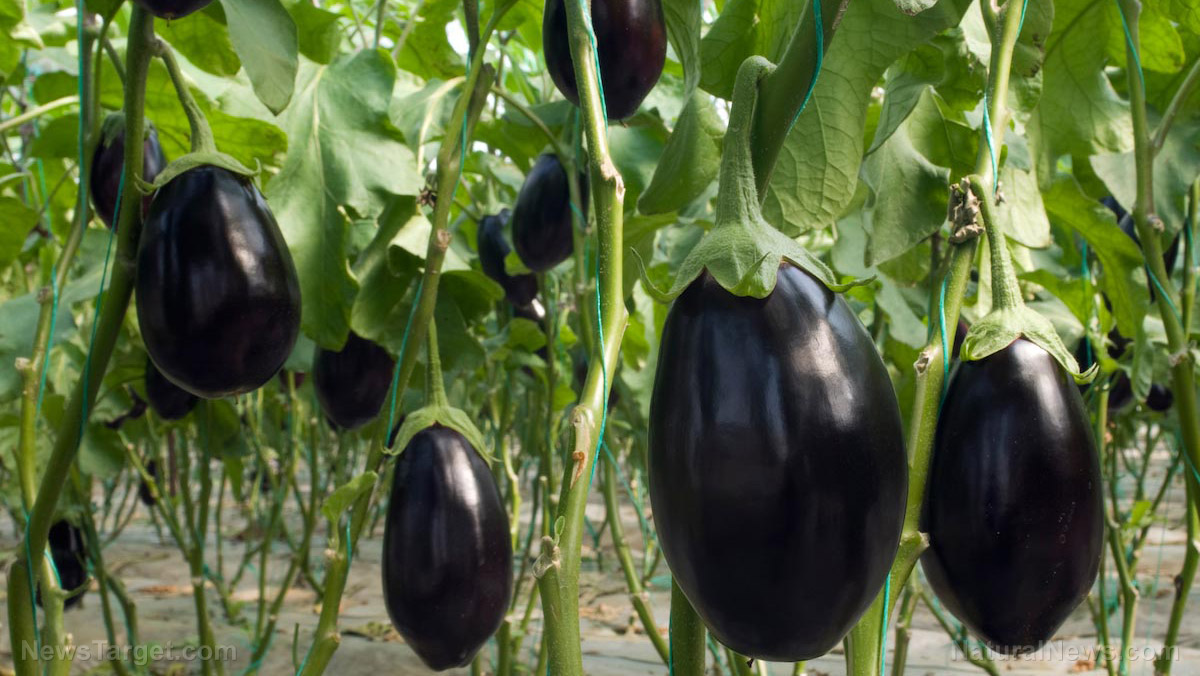 Parler
Parler Gab
Gab
- Eggplants, also known as aubergine, are a versatile and nutritious member of the nightshade family. They come in various colors with a mild, slightly sweet flavor that absorbs other ingredients well, making them a global culinary favorite.
- Originating in India and China over 4,000 years ago, eggplants were initially cultivated for medicinal purposes. They spread to the Middle East and Mediterranean, becoming a staple in cuisines worldwide.
- Eggplants are low in calories and rich in dietary fiber, vitamins (B1, B6, K), and minerals (potassium, manganese). Their deep purple skin contains anthocyanins, particularly nasunin, which supports brain health, and chlorogenic acid, an antioxidant linked to cardiovascular benefits.
- Eggplants are featured in many global dishes, such as Mediterranean ratatouille and moussaka, Indian baingan bharta and Middle Eastern baba ganoush. They can be grilled, stuffed, roasted or used in recipes like eggplant lasagna, salads and stews, making them a versatile and nutritious addition to a healthy diet.
Eggplants: A closer look
Eggplants are known for their distinctive colors and shapes. The most common variety, often found in Western cuisine, has a deep purple, almost black, color and glossy skin. However, eggplants can also be found in shades of white, green and even striped patterns, depending on the variety. Their shapes range from the elongated and slender Japanese eggplant to the plump and round Italian varieties. When cut, the flesh of the eggplant is white and spongy, which can vary in texture from firm to soft when cooked. In terms of taste, eggplants have a mild, slightly sweet and somewhat earthy flavor, which makes them an excellent base for absorbing the flavors of other ingredients. This adaptability has made eggplants a favorite in cuisines around the world, from the Mediterranean to Southeast Asia.Historical and cultural significance
The origins of the eggplant trace back to ancient times, with evidence suggesting that it was first cultivated in India and China over 4,000 years ago. The earliest written records of eggplant cultivation date back to the 5th century B.C. in China, where it was initially grown for its medicinal properties. From these regions, the eggplant spread to the Middle East and the Mediterranean, where it became a staple in various cuisines. The name "eggplant" is believed to have originated from the 18th century, when European varieties of the plant produced small, white, egg-shaped fruits. In other parts of the world, such as France and the United Kingdom, it is known as "aubergine," a term derived from the Arabic "al-badhinjan." In India, it is commonly called "brinjal," and in some parts of the United States, it is referred to as "melongene." (Related: Custard apple: A nutrient-packed superfruit with ancient roots.)Nutritional composition and phytonutrients
Eggplants are not only low in calories but are also packed with essential nutrients and phytonutrients. They are a good source of dietary fiber, vitamins B1, B6 and K, and minerals like potassium and manganese. The deep purple skin of the eggplant is particularly rich in anthocyanins, a type of flavonoid with potent antioxidant properties. One of the most notable phytonutrients found in eggplants is nasunin, an anthocyanin that has been shown to protect the lipids in brain cell membranes, potentially aiding in cognitive function and reducing the risk of neurodegenerative diseases. Eggplants also contain chlorogenic acid, another potent antioxidant that has been linked to lower blood pressure and improved cardiovascular health.Health benefits and potential therapeutic uses
The nutritional profile of eggplants makes them a valuable addition to a healthy diet. Here are some of the potential benefits and therapeutic uses of eggplants:- May help manage blood sugar levels – The high fiber content of eggplants can help regulate blood sugar levels, making them a suitable food for individuals with diabetes.
- Contains antioxidants with anti-inflammatory properties – The rich array of antioxidants in eggplants, particularly nasunin and chlorogenic acid, can help reduce inflammation and oxidative stress, which are factors in a wide range of chronic diseases, including heart disease and cancer.
- Can help with weight loss – Research suggests that consuming eggplants may also aid in weight management and support digestive health. The fiber in eggplants can promote a feeling of fullness, potentially reducing overall calorie intake, while the spongy texture of the flesh can help maintain a healthy gut microbiome.
Culinary applications and recipe ideas
The culinary applications of eggplants are vast, and they can be found in various dishes across different cultures. In the Mediterranean, eggplants are a key ingredient in dishes like ratatouille, caponata and moussaka. In Indian cuisine, they are used in curries, such as baingan bharta, and in the Middle East, they are featured in dishes like baba ganoush. For those looking to incorporate more eggplants into their diet, there are countless recipes to explore, such as:- Grilled, stuffed and roasted – Grilled eggplant slices, stuffed eggplants and roasted eggplant dips are simple and delicious ways to enjoy this vegetable.
- Eggplant lasagna – For a heartier meal, eggplant parmesan or eggplant lasagna can be excellent choices.
- Eggplant salad or stew – For a lighter option, try a chilled eggplant salad or a flavorful eggplant and chickpea stew.
More related stories:
The power of dates: A sweet superfood from ancient times. The king of fruits: Exploring the wonders of durian. Bitter taste, big rewards: How African cucumber (bitter melon) can transform your health. Sources include: Brighteon.AI NaturalNews.com Brighteon.comPrepper essentials: Why bucket food is a game-changer for emergency preparedness
By HRS Editors // Share
Unveiling the mystique of vetiver: An essential oil for wellness
By Laura Harris // Share
Aloe vera: Top uses for this easy-to-grow plant
By News Editors // Share
Eleven steps to revitalize the practice of medicine
By News Editors // Share
Biden’s dietary guidelines under fire: How political agendas are undermining American health
By Willow Tohi // Share
None of the 70,000 adverse events of puberty blocking drugs were a “safety priority” for Biden’s FDA
By News Editors // Share
Governments continue to obscure COVID-19 vaccine data amid rising concerns over excess deaths
By patricklewis // Share
Tech giant Microsoft backs EXTINCTION with its support of carbon capture programs
By ramontomeydw // Share
Germany to resume arms exports to Israel despite repeated ceasefire violations
By isabelle // Share










